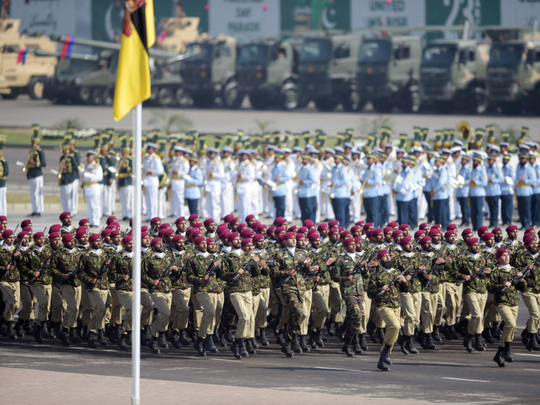
An elaborate parade in Islamabad just this past week, to commemorate Pakistan Day on March 23, said it all. The occasion is an annual celebration in remembrance of the historic event in 1940 when Muslims of British-ruled colonial India formally chose to create a homeland of their own.
Pakistan’s journey of survival through a series of trials and tribulations was abundantly visible through the parade that stood out as a powerful reminder of the nation’s resilience and strength. An array of weapon systems on display for use by Pakistan’s land, naval and air forces amply highlighted the extent to which the country’s defensive capability has come of age.
The nuclear-armed nation’s half a million-strong armed forces personnel have repeatedly risen to defend Pakistan in times of crisis, including periods when foreign technology was denied. And yet, this capability on its own is hardly relevant beyond just facilitating a temporary victory that must be subsequently buttressed with a host of follow-up actions. In recent years, a visibly dismal outlook surrounding Pakistan’s civilian structures has often prompted anxieties over the fate of such vital military successes. In spite of the pomp surrounding the March 23 event, Pakistan remains mired in a host of challenges.
The highlights of the parade itself included the first-ever presence of troops from China’s land, naval and air services, who stood on display along side their Pakistani compatriots. China has been a time-tested friend of Pakistan, having come to the country’s aid in moments of crisis and international isolation.
The aerial display by the Pakistan Air Force would have been incomplete without the presence of the JF-17 ‘Thunder’ fighter planes, jointly manufactured by China and Pakistan. Meanwhile, the Pakistan army’s main battle tank, Al Khalid, could not have been completed successfully without China’s assistance. And finally, the growing reach of the Pakistan navy is now clearly anchored on plans to purchase at least eight Chinese submarines, which will start arriving in about five years from now.
Ironically, however, the growing military strength of Pakistan needs to be backed by undertaking hitherto incomplete economic reforms with a clearer focus on empowering those at the grass-roots level. In sharp contrast to Pakistan’s clearly visible military strength, the country’s economy continues to suffer from questions over a number of variables.
While Pakistan’s accountant-turned-politician Finance Minister Ishaq Dar often takes pride in presiding over a period of robust economic revival, nothing could be further from the truth. In recent months, the Karachi Stock Exchange or KSE has progressed with leaps and bounds, giving ammunition to the government’s case.
And yet, a question worth asking is whether this is indeed evidence of a broader economic success? Across Pakistan, almost one-third of the population is widely believed to continue living in abject poverty. In the past 18 months, a crash in Pakistan’s agricultural sector has effectively deprived between 50 to 60 per cent of the population from a part of their incomes. That’s the estimated number of Pakistanis who are believed to depend directly or indirectly on agriculture as their main source of sustenance. Meanwhile, sluggish exports from Pakistan also indicate a slowdown in its industrial production. Taken together, these two sectors — agriculture and industry — cater to the needs of at least 70 per cent of the country’s population.
Meanwhile, Prime Minister Nawaz Sharif’s government appears to be laying the course for the next parliamentary elections due in 2018. Towards that end, the ruling structure is driven in part by questionable economic priorities such as dedication to populist schemes. Building roads and Metro buses to win votes has conveniently become the regime’s priority, notwithstanding their significance for Pakistan. In an ideal world, such development projects could well be justified if indeed Pakistan had the resources to afford them. However, Pakistan does not have that luxury.
At a time when the country’s water resources are depleting and Pakistan remains surrounded by an unprecedented energy crisis, the government should focus on water storage facilities as one of its top objectives. Building dams may take longer than fancy bus services. But in the overall economic scheme of things, the priorities being pursued by the Sharif government will not yield economic dividends to serve Pakistan’s best interests.
Amidst the questionable pursuit of priorities, Pakistan’s political system remains apparently disconnected from the most pressing challenges faced by the country. Though it returned to full democratic rule in 2008, the federal and provincial legislatures are yet to show evidence of comprehensively debating the prevailing security challenges with a view to recommending a comprehensive set of actions. As Pakistan’s politicians have practically twiddled their thumbs on the best way forward to tackle prevailing security challenges, the saving grace has indeed been the Pakistan army, which has taken back territory once occupied by militants. Pakistan’s armed forces may have equipped themselves to tackle the challenges faced by the country, but consolidating that victory is vital to turn the tide in securing the country.
The March 23 parade may well provide a timely reminder of the success stories built with cooperation from China, which remains Pakistan’s closest friend. Going forward, China’s promise to invest more than $55 billion (Dh202.29 billion) in Pakistan’s infrastructure presents both an opportunity as well as a risk. While the opportunity is all too obvious, the risk will emerge from the failure of the ruling structure to reform Pakistan internally in a way that key challenges finally begin to be addressed.
Farhan Bokhari is a Pakistan-based commentator who writes on political and economic matters.










